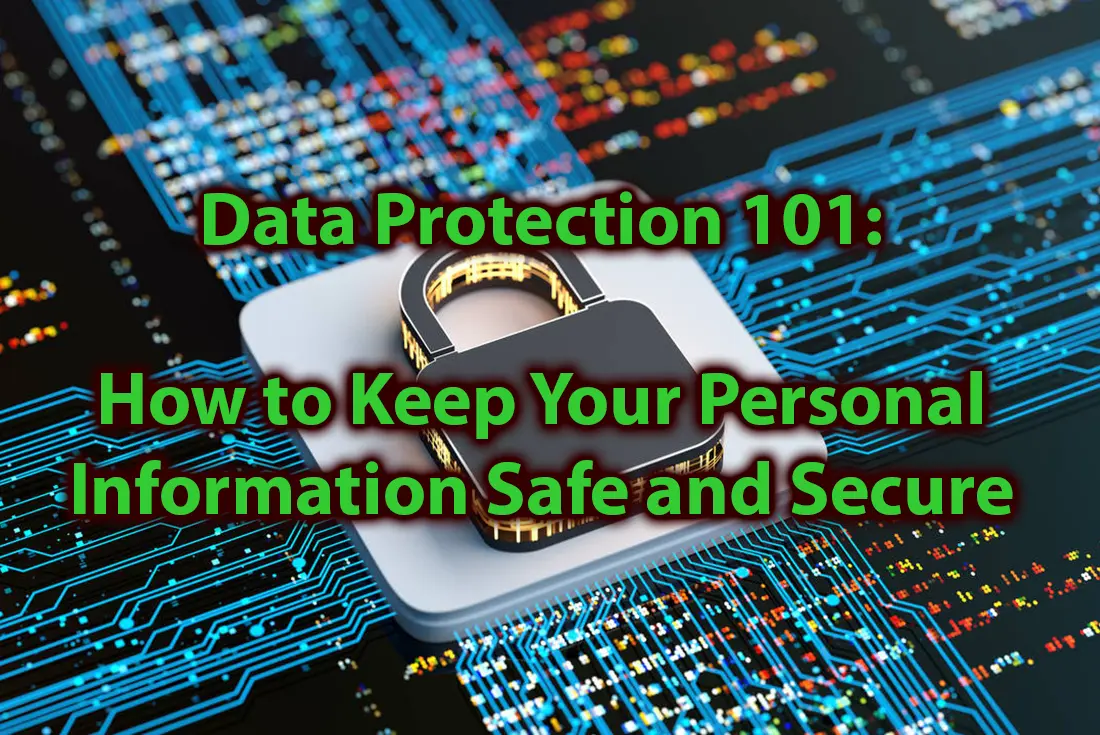
22 Jan Data Protection 101: How to Keep Your Personal Information Safe and Secure
Welcome to the world of data protection, a crucial aspect of our digital lives. Data protection refers to the practices and safeguards put in place to secure personal information from unauthorized access, theft, or misuse.
The importance of data protection cannot be overstated. As our lives become increasingly intertwined with the digital world, so does our personal information. It is everywhere, from social media profiles to online banking details. This has led to growing concerns over personal information security.
Data protection guards our personal information and fosters trust in the systems we use daily. Whether you’re sending an email, shopping online, or using a fitness tracking app, data protection mechanisms are working behind the scenes to keep your personal information safe and secure. Keep reading to learn more about data protection 101.
Understanding the Threats to Personal Information
In today’s interconnected world, protecting personal information has become more important than ever. To ensure your data remains safe and secure, it’s crucial to understand the threats that can compromise your personal information.
Types of Data Breaches and Cybersecurity Risks
- Malware and Phishing Attacks: These are common types of cyber threats. Malware is malicious software designed to harm or exploit any computing device or network. Phishing attacks, on the other hand, involve tricking individuals into providing sensitive information, like passwords or credit card numbers, often through deceptive emails or websites.
- Identity Theft and Social Engineering: Identity theft involves someone using another person’s personal information, usually for financial gain. Social engineering is a method used by cybercriminals to deceive people into revealing confidential information, typically through manipulation or trickery.
- Weak Passwords and Unauthorized Access: Weak or easily guessable passwords can make your personal information vulnerable to unauthorized access. Cybercriminals often use automated tools to guess passwords and gain access to accounts.
Consequences of Data Breaches and Privacy Violations
- Financial Loss: A data breach can result in significant financial loss. This can occur when cybercriminals steal sensitive financial information like bank accounts or credit card details.
- Reputational Damage: If your personal information is misused, it can lead to reputational damage. This is especially true for professionals and businesses who rely heavily on their reputation.
- Legal Implications: Depending on the nature and severity of a data breach, there could be legal implications. Victims of data breaches may have the right to seek compensation for damages suffered, and businesses that fail to protect customer data could face penalties.
Understanding these threats is the first step in protecting your personal information. By being aware of these risks, you can proactively safeguard your data.
Secure your business from online threats with Downtown Computer Services!
Whether you need firewall protection, VPN access, or secure data sharing solutions, we have got you covered.
Don’t struggle with the modern world of cyber threats. Let us handle your IT security needs so you can focus on what you do best – running your business. Contact us at (954) 524 9002
Best Practices for Data Protection
Understanding potential threats is only half the battle; the other half is knowing how to protect your data. Here are some data protection 101 best practices you can adopt to keep your personal information safe and secure.
Creating Strong Passwords and Using Two-Factor Authentication
Your first line of defense in data protection is creating strong, unique passwords. Avoid obvious choices like “password” or “123456”, and aim for a mix of letters, numbers, and symbols. Additionally, two-factor authentication (2FA) adds an extra layer of security, requiring a second form of verification besides your password.
Regular Software Updates and Antivirus Protection
Keeping your software up-to-date is crucial for data protection. These updates often include patches for security vulnerabilities. Similarly, reliable antivirus software can detect and remove threats before they compromise your data.
Secure Internet Browsing and Email Practices
Be mindful of the websites you visit and the emails you open. Stick to secure websites (those with ‘https’ in the URL) and avoid clicking on suspicious email links.
Safeguarding Personal Information on Social Media
Social media can be a goldmine for identity thieves. Be cautious about the information you share online, adjust your privacy settings, and be selective about who you connect with.
Encryption and Secure File Storage
Encryption converts your data into a code that can only be accessed with a key. Use encryption for sensitive files and secure storage solutions with high-level encryption.
Data Backup and Recovery Strategies
Regular data backups can save you from data loss in case of a breach. Furthermore, having a recovery strategy in place ensures you can restore your system quickly and efficiently.
By adopting these best practices, you can significantly enhance the security of your personal information. Data protection 101 is an ongoing process, not a one-time task. Stay vigilant, stay updated, and stay safe.
Data Protection in Different Scenarios
Data protection isn’t a one-size-fits-all approach. Different scenarios require different strategies. Below, we’ll explore how to protect your personal information in various settings.
Protecting Personal Information on Mobile Devices
Mobile devices are treasure troves of personal information. Keep your device secure by using strong passwords, enabling auto-lock, and regularly updating your operating system and apps. Also, consider installing a trusted mobile security app for added protection.
Ensuring Security in Online Shopping and Payment Transactions
When shopping online or conducting payment transactions, only use secure and reputable websites. Look for ‘https’ in the URL and a padlock symbol in the address bar. Avoid making transactions on public Wi-Fi networks, as they can be less secure.
Data Protection Tips for Social Networking Platforms
Exercise caution when sharing information on social networking platforms. Use privacy settings to control who sees your posts, be wary of friend requests from people you don’t know, and avoid clicking on suspicious links.
Securing Personal Data in the Workplace
Always log out of systems in the workplace when you’re not using them. Don’t click on suspicious emails, and report any potential issues to your IT department. If you work remotely, use a secure and encrypted internet connection.
Privacy Measures for Internet of Things (IoT) Devices
Many IoT devices collect personal data. To protect yourself, change default passwords, regularly update software, and disable unnecessary features. Also, consider a network security solution that can protect all your connected devices.
The key to effective data protection is vigilance and regular maintenance. Stay informed about potential threats and take proactive steps to safeguard your personal information.
Legal and Ethical Considerations in Data Protection
While technological measures are crucial in data protection 101, it’s also important to understand the legal and ethical landscape surrounding this issue. In this section, we’ll delve into some key considerations.
Overview of Data Protection Laws and Regulations
Data protection laws and regulations vary by country and region. They typically dictate how organizations should collect, store, and use personal data. These laws aim to protect individuals’ privacy rights and prevent misuse of personal information.
General Data Protection Regulation (GDPR)
The GDPR is a regulation in EU law that provides stringent data protection and privacy rules. It applies to businesses in the EU and those outside the EU that process EU residents’ data. The GDPR emphasizes transparency, accountability, and individuals’ right to control their personal data.
Balancing Personal Privacy and National Security
There’s often a delicate balance between protecting personal privacy and ensuring national security. Governments may require access to certain data for security purposes, which can raise privacy concerns. The challenge lies in striking a balance that respects individual privacy without compromising national security.
Ethical Practices in Handling Personal Information
Beyond legal requirements, ethical practices play a vital role in data protection. This includes respecting user consent, maintaining transparency about data usage, and ensuring fairness in data processing. Ethical data handling fosters trust and promotes a culture of respect for personal privacy.
Data protection 101 isn’t just about technology; it’s also about adhering to laws and ethical standards. Understanding these aspects can help you better navigate the complex world of data privacy.
Data Protection Tools and Technologies
As we continue to live in an increasingly digital world, data protection tools and technologies are more important than ever. Let’s explore some key tools that can help you secure your personal information.
Antivirus and Firewall Software
Antivirus software is your first line of defense against many online threats. It scans your devices for malicious software and removes it. Firewalls, on the other hand, act as barriers between your device and the internet, blocking potential threats.
Virtual Private Networks (VPNs) for Secure Web Browsing
VPNs create a private network from a public internet connection, masking your IP address and encrypting your data. This makes your online actions virtually untraceable, enhancing your privacy and security while browsing the web.
Encryption Technologies for Data Security
Encryption converts readable data into coded text, which can only be read with a decryption key. It’s a crucial tool for protecting sensitive data, whether stored on your devices or transmitted over the internet.
Biometric Authentication Systems
Biometric systems use unique physical or behavioral characteristics for identification. Examples include fingerprint scanners, facial recognition, and voice recognition. These systems offer an added layer of security, as they are difficult to fake or steal.
When used correctly, these data protection tools and technologies can significantly enhance the security of your personal information. However, remember that no tool can provide 100% security. Always stay vigilant and adopt good data protection practices.
Educating Others on Data Protection
Data protection 101 is a shared responsibility, and education plays a crucial role in fostering a culture of data privacy. Let’s look at how we can educate others about this important issue.
Spreading Awareness about Data Protection Risks
Firstly, it’s essential to spread awareness about the risks associated with data breaches. This can be done through blog posts, social media campaigns, or community discussions. The aim is to make people understand that their personal information is valuable and vulnerable to threats.
Conducting Workshops and Training Sessions
Workshops and training sessions can provide practical knowledge on data protection. These sessions can cover topics like creating strong passwords, recognizing phishing attempts, and using secure networks. They can be tailored to different audiences, from tech novices to advanced users.
Teaching Children and Young Adults about Online Safety
Children and young adults are particularly vulnerable online. It’s crucial to teach them about online safety, including the importance of not sharing personal information online, recognizing cyberbullying, and understanding the implications of digital footprints.
Encouraging Responsible Data Handling Practices
Finally, we should encourage responsible data handling practices. This includes respecting others’ privacy, obtaining consent before collecting or sharing personal data, and being transparent about how data is used.
Educating others about data protection 101 is crucial to creating a safer digital world. Remember, knowledge is power, and in this case, it’s the power to protect our personal information.
Conclusion
Throughout this article, we’ve explored various aspects of data protection, from legal and ethical considerations to tools and technologies and the importance of education in fostering a culture of data privacy.
Remember, data protection is a shared responsibility. It’s not just up to businesses and governments to protect our personal information. We, as individuals, also play a crucial role. From setting strong passwords to being mindful of the information we share online, every action counts.
It’s time to take data protection seriously! Contact Downtown Computer Services at (954) 524 9002 to learn more about cyber security for your small business!
Check out other relevant news
- How Easy-to-Use Hacking Tools Are Fueling Cybercrime
- Cryptocurrency Security for Small Businesses: Protecting Your Wallet
- The Infostealer Epidemic: Protecting Your Business from the Latest Wave of Cyberattacks
- The Identity Crisis: How Compromised Credentials Can Cripple Your Business
- Beyond the Brick and Mortar: Building Your Online Storefront with Digital Marketing
